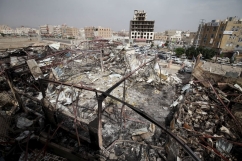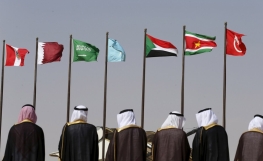It's a difficult thing to look into the eyes of a starving child.
There's something so incredibly bleak about the kind of images that to many of us in the West were unimaginable until the arrival of modern technology.
Michael Buerk's reporting from the Ethiopian famine in 1984 was the first exposure many of us had to the horrific consequences of prolonged starvation on a mass of people.
In the case of Ethiopia, as with many examples of chronic food shortage, the problem wasn't just 'natural' – the crops didn't simply fail because of nature. Instead, Ethiopia was a country suffering under years of Dictatorship – specifically that of the Derg, the Stalinist regime which used hunger as a weapon.
When we are presented with images of starvation, it is incumbent on us to ask, not only what the natural causes might be, but where the political impetus is coming from.
Finally, five years after some brave journalists began reporting hunger in Yemen, the conflict has become newsworthy in the West. The Times carried a harrowing picture of the suffering going on in the small Arab nation on its front page last month. Now we know, we need to ask why this suffering is being perpetrated and, more challengingly, if we in the US and UK are partly responsible.
If a natural disaster is tragic, then a politically and militarily enforced humanitarian disaster is obscene. The principalities and powers are conspiring to leave Yemen's innocent children short of food, medicine and worst of all, hope.
Evangelical NGO Tearfund says the situation in Yemen is so dire that it should be ranked alongside the devastating crisis in Iraq and Syria. "The statistics speak for themselves" says an article on Tearfund's website, "over 21 million people urgently need humanitarian assistance – that's 83% of the population, higher than for Syria (74%). Over 14 million lack safe regular access to food – rising to 19 million for water and sanitation."
These are astonishing figures. To put them in context, look at the United States. If an equivalent percentage of US citizens were under threat of starvation, it would equal 284 million Americans. Make no mistake, this is a calamity.
The UN, which is also now categorising Yemen as one of the three most serious situations in the world – along with Iraq and Syria – has detailed the devastating consequences of the violence in Yemen. The UN also says, "Those engaged in the conflict are not meeting their basic responsibilities, under international law, to respect, protect, and meet basic needs of the civilian population." Oxfam has camapigned for an end to hostilities and has described Yemen as being "on the bring of catastrophe".
This is the heart of the problem. Neither side in what is both a civil war within Yemen, and a proxy war within the wider Middle East, seems to be respecting human rights. Worse still, one of the sides is backed by the West.
Essentially, the conflict is between forces loyal to two men who claim to be the rightful president. In the worlds of Iona Craig, a journalist who has done more than most to draw attention to Yemen's crisis, "Saudi Arabia waded into what began as a domestic political power struggle between the country's incumbent president, Abd Rabbu Mansour Hadi, and his predecessor of 33 years' standing, Ali Abdullah Saleh. The marginalised, predominantly Shia Houthi militiamen, viewed as an Iranian proxy by the Sunni kingdom [Saudi Arabia], joined forces with Saleh's loyalists in the military to seize swathes of territory over the past 18 months."
Since then, both sides have been accused of various human rights abuses. But, disgracefully, Britain and the US continue to support the Saudi-led coalition. In an excoriating piece, Peter Oborne highlights the British complicity in Saudi's war: "In the face of a mountain of evidence that crimes have been committed, Britain repeatedly insisted that the Saudis have not breached international humanitarian law. Britain has advisers in the heart of the Saudi command centre which sets targets for the bombers. We provide Saudi with crucial diplomatic cover, for instance blocking Dutch calls for a very badly needed independent inquiry into war crimes by all sides. Throughout the war we have supplied arms to the Saudis. This is almost certainly illegal."
Funerals, hospitals and other civilian targets have been hit during the war. The Obama administration also offers support. The New York Times reported that, in the wake of the Saudi bombing of an MSF hospital, "the Pentagon has given steady support to the coalition led by Saudi Arabia, with targeting intelligence and fuel for the Saudi planes involved in the air campaign."
The reason we're given? Well, as Prime Minister Theresa May insisted in the House of Commons, "Our relationship with Saudi Arabia is an important relationship. It's a particularly important relationship in relation to the security of this country and counter-terrorism."
What craven nonsense. May suggests that keeping British people safe comes at the expense of Yemeni lives. Well, not in my name. Our reprehensible genuflection before the Saudis is one of the deepest stains on modern British and American foreign policy. No 'pragmatist' talk about our oil dependency or the (very real) need to keep our citizens safe from terrorists will persuade me otherwise.
What makes it even harder to swallow Western support for Saudi Arabia is its treatment of Christians. Open Doors describes the level of persecution of the 1.2 million believers in Saudi as "severe" and says anyone who converts from Islam is in danger of losing their life.
As we gather to remember our brave servicepeople who have given so much over many generations to keep the West safe from fascism, we should gather with a sense of deep disquiet that our governments aren't merely standing by on the other side – we seem to be deepening and intensifying one of the world's most deadly conflicts.
Shame on us.
Follow Andy Walton on Twitter @waltonandy
















